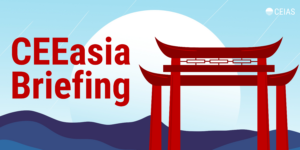In the past decades, Germany and China became intensively intertwined and dependent – be it in the economic or the academic sphere. This economic dependency, which for a long time followed the ideal of “change through trade”, has come under scrutiny within the past few years and even more so after Russia’s attack on Ukraine and facing the reality of being overly dependent on Russian natural resources. Questioning academic interdependence with China has just started very recently, only in the past two or three years have Confucius Institutes at German universities been debated more intensively. A wide public debate on other problematic academic cooperation with China started just this year.
The following overview is mainly based on information on the research cooperation of a sample of 19 German research institutes and 36 German universities that are covered in the CEIAS mapping. The sample includes the largest 20 German universities as well as universities that have been previously known to cooperate with Chinese entities. The research institutes were chosen due to the probability of obtaining information through FOI requests as well as their legal structure.
Lack of transparency
German research institutions’ cooperation with their Chinese partners is highly untransparent. When asked by the author of this paper to provide information on their links with Chinese institutions, only three out of 55 German research institutes and universities provided substantial information. This mirrors a similar research attempt by the author conducted in 2020, which explored financial income by German universities from Chinese sources, where also only a minority of universities provided information.
This lack of transparency originates mainly from a lack of legal obligations universities and research institutes have to provide information on their cooperation with entities from authoritarian countries. Freedom of information laws do not exist in all German federal states and, in many cases, they ask for high fees (up to €1,000 per case) or exclude research entities completely. The latter is based on a belief that transparency would harm academic independence. However, this is a reasoning that has been largely rendered obsolete in light of recent developments in academic relations with partners originating from authoritarian countries, such as China.
Regulations
For the same reason, no laws exist in Germany that specifically regulate academic cooperation with entities in China or other authoritarian countries. The German Federal Office of Economics and Export Control (BAFA) theoretically has to check whether cooperation in the academic area is security-related and, in certain cases, could stop this cooperation. The problem, though, is that researchers themselves need to actively approach the BAFA for a potential security screening. Furthermore, basic research, which also could have dual-use applications is not subject to approval in most cases.
On the federal level, the BAFA has published guidelines specifying the above-mentioned legislation. Non-state actors also have published guidelines on cooperation with China. Most notable, the German Rectors Conference in 2020 published “Guiding questions on university cooperation with the People’s Republic of China”. But these questions do not implement standard procedures for cooperation with Chinese entities, rather they are guidelines for universities that can be implemented or ignored. For instance, in the case of transparency, they argue for a higher degree of such, but as the authors’ research has shown universities are still hesitant to provide information on their cooperation with the PRC although stipulated differently in the “guiding questions”.
Confucius Institutes
There are currently 19 Confucius Institutes in Germany. The majority were founded by German universities in cooperation with a Chinese university and/or Hanban. Only one Confucius Institute, in Munich, has never officially cooperated with a German university, though they do for singular events. Within the past two years, some German universities ended their partnerships with CIs or are rethinking them. In the cases of the University of Düsseldorf and the University of Hamburg, the contracts were discontinued in 2020. The University of Trier in 2021 “suspend[ed] the activities of the Institute until further notice” after Chinese sanctions against European academics. The cooperation agreement between the University of Bonn and its Confucius Institute expired in 2021 and no new activities will be started as the “negotiations on further cooperation have been stalling on ‘contract amendments’” since 2020.
The case of the University of Hamburg sheds light on academic interference within Confucius Institutes. In 2014, the CI hosted an event on the Tian’anmen massacre. After this event, the Chinese co-director was ordered back to China. This apparently was one reason why the university canceled its partnership with the CI. In another prominent case, a book lecture on a Xi Jinping biography at the Confucius Institute in Duisburg and at the institute in Hannover was canceled in 2021 because of pressure from the cooperating Chinese university and the local Chinese consulate.
Most of the Confucius Institutes offer lecture series and Chinese classes for the general public. Many of them also offer Chinese classes to their affiliated universities or conduct other sorts of cooperation with the universities. In some cases, these services are directly provided by the CI, and in others by Hanban (resp. its successor organizations). The Free University of Berlin receives approximately €480,000 to finance a Chinese language professorship, as well as at least one free Chinese lecturer. The University of Göttingen had a similar arrangement. Many other German universities receive funding or free Chinese lecturers from Hanban. At least 11 universities accept or accepted such funding. Most of these universities save tens of thousands of euros each year as they don’t have to hire Chinese teachers themselves. Some of the professors at the universities publicly admit their dependence on CIs as “the university itself does not have the necessary funds to provide additional teaching staff.” This probably is valid for many of the links between CIs/Hanban and German universities, although the responsible leadership/professors only admitted so publicly in a few cases.
High-risk academic interactions
German research institutions interact with many Chinese entities labeled as high or very high risk by the ASPI China Defense University Tracker. Among the 784 covered research links, 90 are with Chinese institutions labeled as high-risk, and 127 are labeled as very high-risk. 40 links in the sample were with universities being part of the “Seven Sons of National Defense”. In 141 cases, German institutions cooperated with PRC institutions that conducted economic espionage or misconduct in the past. In 127 cases, the cooperating Chinese institution has been put on entity lists of foreign governments. Almost all German institutions examined interacted with Chinese entities falling under the before-mentioned categories. Only six out of 55 did not. Most of the cooperation with risky Chinese institutions has no financial dimension, only eight out of the 217 risky links include funding for German institutions.
While in many cases the content of the cooperation between Chinese risk entities and German institutions is not known in detail, the fields of cooperation are clearly in strategically important areas. The top cooperation areas in the 217 links examined are computer sciences, economics, aerodynamics, medicine, fluid mechanics, chemistry, physics, mathematics, mechanical engineering, and materials sciences.
In many cases, German universities and research institutes are accepting postdocs and doctoral students who are funded by the Chinese party-state, the Office of the China Postdoctoral Council (OCPC), and the China Scholarship Council (CSC), respectively. At least 10 institutions in the sample accepted CSC-sponsored students and at least 11 accepted OCPC-postdocs.
German institutions also cooperate with Chinese corporations, including Huawei and state-owned corporations in the military sector. Many German universities receive funding from Huawei for different projects. Among those 55 German institutions covered by this project, 15 cooperated with Huawei or its subsidiaries. Commonly, universities receive funding of a few hundreds of thousands of euros per year for joint research projects. Some of the projects funded by Huawei offer initial indications that they could be problematic: The University of Augsburg together with Huawei conducted “research on the recognition of human emotion from voice, speech and facial expressions in various scenarios,“ possibly contributing to technology development used for repression in China. The Technical University of Berlin cooperated with Huawei on at least six projects, some of which might produce research outputs that could be used in video surveillance.
In eleven cases, there are links between German research institutions and Chinese state-owned corporations. In most cases, these are military-related companies. In five cases the German Aerospace Center conducted basic research in the field of aerodynamics in cooperation with different institutes of the Aviation Industry Corporation of China (AVIC). According to ASPI, AVIC is a high-risk partner as it is “China’s primary supplier of military aircraft”.
Recommendations
The federal government, state governments, and research institutions should respond to the risky academic cooperation currently still happening between China and Germany. In particular, different actors could conduct the following risk mitigation measures. To increase transparency, state parliaments should pass legislation obliging research institutions and their employees to regularly publish all financial records and contractual agreements, as well as a structured overview of other cooperation between them and entities based in authoritarian countries to allow a public debate about it.
To encourage universities and research institutes to rethink their risky but financially beneficial cooperation with PRC actors, federal funding (directly or indirectly, such as from the German Research Foundation or the Federal Ministry of Education and Research), in the short term should not be provided to researchers and institutions who accept funding from PRC entities or rely on PRC-sponsored researchers. In the long-term, federal and state funding of research fields currently receiving funding from PRC actors or relying on PRC-sponsored researchers has to be increased significantly.
To better prepare research institutions for cooperation with PRC actors, the federal government should, in cooperation with its EU partners, establish a knowledge and research center that develops and maintains a regularly updated risk assessment database analyzing potential Chinese partners.
To implement a professional security screening of research cooperation, state governments should make the establishment of ombudspersons for security-related issues at universities and research institutes obligatory. Researchers should be obliged to consult these ombudspersons before cooperating with partners from authoritarian countries and document their risk assessment before starting cooperation. This risk assessment could rely on the information gathered by the knowledge and research center.
To raise awareness and deter research institutions from conducting risky cooperation, the German Customs Investigation should conduct regular random checks on research projects conducted by German researchers in cooperation with high-risk entities in authoritarian countries. Customs should regularly and publicly publish cases of uncovered misconduct.







